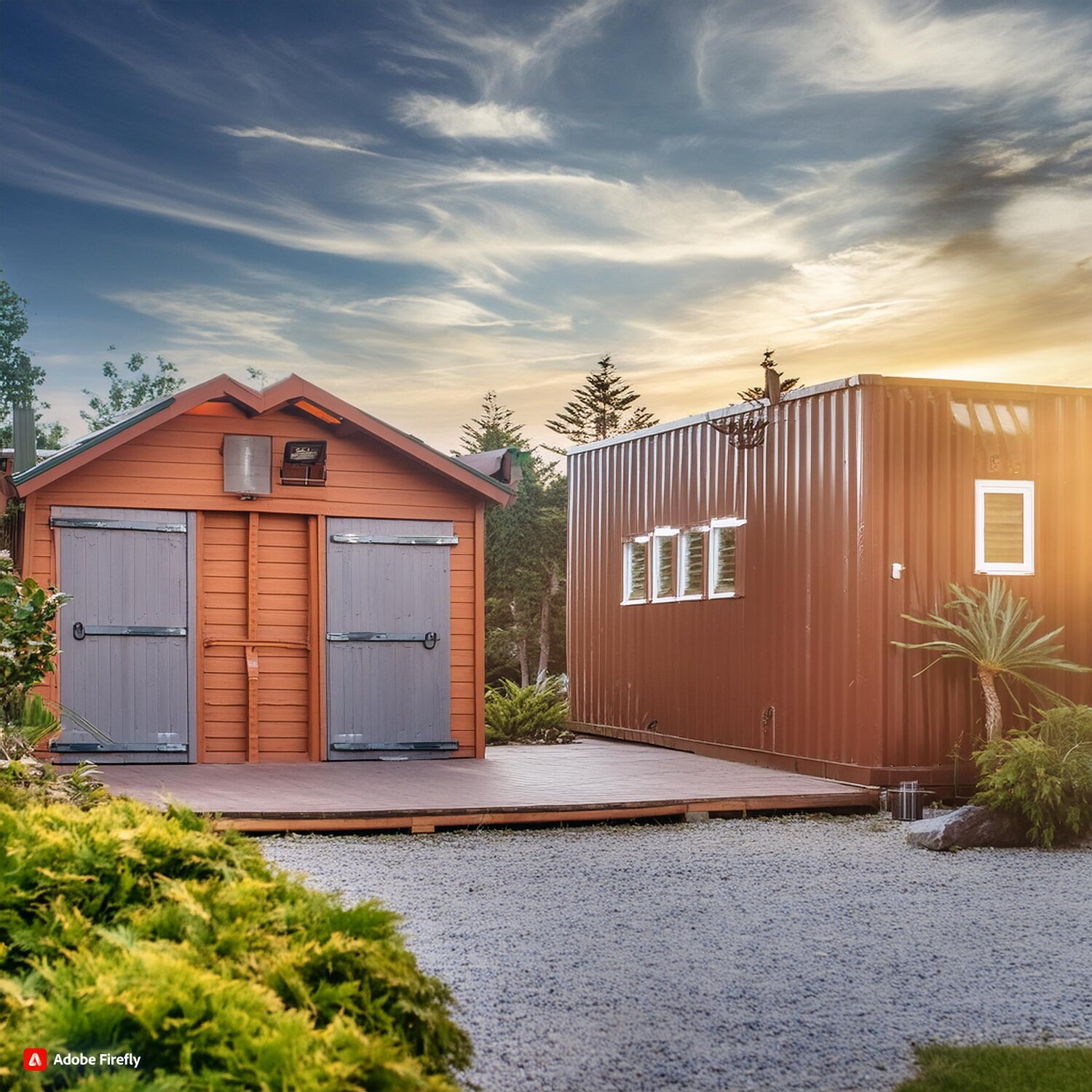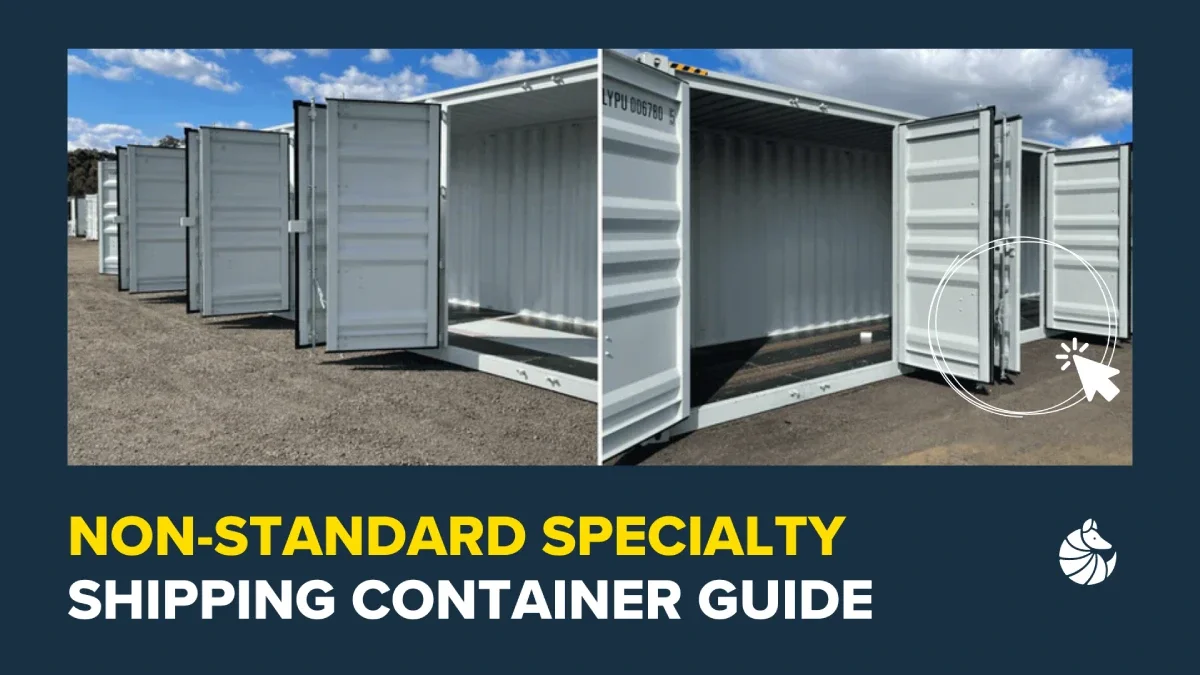Track my order
RESOURCES
Buying vs Renting a Shipping Container: A Comparison Guide



No pressure, procurement managers—but every decision you make directly influences your company’s bottom line. With shrinking budgets and rising costs, partly driven by the global shipping disruptions we’ve experienced throughout the year, the weight of each purchasing choice has never been heavier.
One question you might be wrestling with is whether to rent or buy a shipping container. We’re here to help you navigate that decision, offering practical insights so you can choose what’s best for your business.
What Do You Need the Container For?
Before we weigh the pros and cons of renting versus buying, let’s take a moment to consider what your business needs. Are you looking for some extra storage space? Maybe you’re thinking about setting up a temporary office or even launching a pop-up shop. How long do you expect to need the container—just a few months, a year, or indefinitely? And let’s not forget the big one: What’s your budget?
These questions matter because the right decision—whether to rent or buy—depends on your specific situation. For instance, if your business experiences seasonal fluctuations, renting a shipping container for temporary storage might give you the flexibility you need. On the other hand, if you’re planning for the long haul, buying a shipping container for storage could be the smarter, more cost-effective choice.
If you're leaning toward renting a storage container for a short-term project or considering buying shipping containers for your business, it’s essential to match the type of container to your needs. Cargo containers (also known as ISO containers or conex boxes) each bring unique features to the table, tailored for different uses. If you're uncertain about which container fits your needs best, check out our Choosing the Right Shipping Container guide. It breaks down the options, making it easier to find your perfect match.
Why Renting Might Be Right for You
Renting a freight container can be a feasible choice, especially for short-term projects. A rented container gives you the agility to adjust your container needs as your project evolves. Whether you need extra space during peak seasons or want to scale down later, renting provides the adaptability you need without locking you into a long-term commitment. Moreover, if you're navigating tight budget constraints, renting sidesteps the larger upfront cost that comes with purchasing.
A standout benefit of renting is the reduced responsibility for maintenance. Typically, the rental provider handles repairs and upkeep, sparing you the time and hassle. This is particularly helpful for businesses without the resources to manage container maintenance in-house. Plus, when the container is no longer needed, you avoid the logistical headache of finding storage, which is a common issue for companies with limited space.
Another aspect to consider is the speed at which you need the container. Renting a shipping container can sometimes be quicker compared to buying, as rental companies usually have a selection of containers ready for immediate use. This can be a game-changer if you're working against tight deadlines.
Cost-wise, shipping container rent prices vary based on factors like size, duration, and location. It's important to shop around, compare different providers, and understand the full cost structure, including delivery and pickup fees, to ensure you're getting the best deal. If you're asking, "Can I rent a shipping container?" or "Where can I rent a shipping container?" rest assured, there are plenty of options nationwide.
Renting is also a smart move if you're experimenting with using containers in your operations. For instance, if you're testing out expanded storage capabilities or exploring new business opportunities, renting allows you to experiment without the long-term commitment of purchasing. If the container doesn’t meet your needs, you can simply return it at the end of your rental period, no strings attached.
But before you reach for the phone, it’s important to consider the potential downsides of renting. If your project extends beyond six months, renting might become less cost-effective. In such cases, purchasing could offer better value. If you're leaning toward buying but need more guidance, our How to Buy a Shipping Container guide is also here to help.
The Downsides of Renting
While renting has its advantages, it's not always the best solution. Over time, rental costs can snowball, especially if your project drags on longer than anticipated. (And let’s be real—when was the last time you saw a project finish exactly on schedule?). Plus, there are often hidden fees to consider—such as locks, damage waivers, or late return charges. For instance, if someone tags your container with graffiti, you could be on the hook for repainting costs. What started as a seemingly economical choice can quickly end up costing way more than buying. This is particularly true for projects lasting several months or years, where cumulative rental fees might exceed the purchase price.
Moreover, rental agreements often come with restrictions. If you need to make specific modifications—such as adding windows, insulation, or custom shelving—renting likely won’t give you the freedom you need. Rental companies typically impose strict guidelines on what containers can be used for and what alterations can be made, which can limit your ability to tailor the container to your exact specifications. Additionally, managing rental contracts and scheduling pick-ups and drop-offs on an ongoing basis can be time-consuming, adding another layer of complexity to your operations. This can be a significant drawback for businesses requiring highly customized solutions.
Availability can also be an issue. During peak times, the specific conex box you want might be in short supply, leading to potential delays. This can be a major concern if your project has strict deadlines and you can't afford to wait. On top of that, when you rent, you're bound by the rental company's extensive terms and conditions, which can sometimes complicate things if their rules don't align with your needs.
If you're considering renting a container for international shipping or perhaps moving overseas, it's crucial to understand the potential limitations. While these options exist, they often come with additional logistical challenges, such as coordinating international delivery and ensuring compliance with customs regulations. Renting shipping containers near you or for moving purposes is widely available, but it comes with considerations that must be carefully evaluated before making a decision.
Why Buying Could Be the Better Option
If your needs are long-term or you’re looking for greater flexibility, purchasing a shipping container is likely the smarter route. Ownership gives you the freedom to secure and use the container exactly how you want. Need to add insulation, give it a new paint job, or make other modifications? When you own the container, you can customize it to fit your specific needs perfectly. This kind of flexibility is crucial for businesses with unique requirements, like transforming a container into a pop-up shop or mobile office where both functionality and appearance matter.
While buying requires a bigger upfront investment, it can actually save you money over time, especially if you plan to use the container for several years. The costs you avoid from ongoing rental fees can add up, making ownership a more economical choice in the long run. Plus, it’s not just an expense—it’s an asset. If you ever decide you don’t need the container anymore, you can sell it and get back a portion of what you paid. With the demand for used containers being strong, especially if they’ve been well-maintained, you’ll likely benefit from a decent return on your investment. Even a well-loved, decades-old container has hundreds of dollars of scrap metal value.
One of the best parts of owning a container is the versatility it offers. Whether you’re using it for storage, as a mobile office, or for something entirely different, an owned shipping container is like a blank canvas waiting to be repurposed. This adaptability is a huge advantage for businesses that need flexible solutions. Beyond that, owning a container can align with your company’s sustainability goals. By reusing and repurposing, you’re contributing to a greener planet, reducing waste, and supporting the circular economy—something that’s becoming increasingly important in today’s business world.
For those considering buying used shipping containers or exploring shipping containers for sale or rent, ownership offers long-term value and the freedom to customize as needed. Moreover, owning a container allows you to plan for future projects without the hassle of negotiating new rental agreements each time a need arises.
The Drawbacks of Buying
Of course, buying isn’t without its challenges. The initial cost can be a hurdle, especially if your budget is tight but luckily companies like Boxhub offer financing through Klarna. And unlike renting, where maintenance is someone else’s problem, owning a container means you’re responsible for its upkeep. You’ll need to handle any repairs modifications, and make sure the container stays in good condition. Over time, these costs are relatively small, but can add up if your container faces harsh weather or is put to heavy use over many years.
And when your project wraps up, what do you do with the container? If you don’t have the space to keep it, storage can become a real headache. In urban areas, where space is limited, storage costs can be high. Plus, the logistics of moving and storing something as large as a shipping container aren’t exactly simple—it takes careful planning and coordination to get it right.
And while selling the container is always an option, how much you get back depends on the market. There’s no guarantee you’ll recover your full investment, especially if the market is down when you’re ready to sell. The resale value can fluctuate based on the condition of the container, current demand, and whether cheaper alternatives are available.
Making Your Decision: Summing It All Up
Deciding whether to rent or buy a shipping container ultimately boils down to your specific needs and circumstances. Here’s a quick recap to help you decide:
• Renting is ideal for short-term projects, offering flexibility, lower upfront costs, and freedom from maintenance worries.
• Buying makes sense for long-term needs, providing full control over modifications, and can be a smart long-term investment.
When you rent a shipping container, you might pay between $75 and $100 a month. Rental periods typically range from 12 to 18 months, which means you’re looking at a total cost of around $900 to $1,800.
On the other hand, buying a used 20ft container could set you back about $1,500 to $3,000 upfront, depending on factors like condition, location, and delivery costs. The advantage? You can sell it later and recover a good chunk of the cost.
Ultimately, it depends on your situation, and we’ve got a handy calculator to help you figure out which option works best for you. Check it out below!
Renting vs. Purchasing Calculator for Shipping Containers
Renting a shipping container
Monthly rental rate ($)
Rental duration (months)
One-time collection cost ($)
One-time delivery cost ($)
Purchasing a shipping container
Container purchase price ($)
Shipping cost ($)
Final Thoughts
Choosing between renting and buying a shipping container is a big decision, but it doesn’t have to be overwhelming. We’re here to simplify the process. Whether you need a container for a few months or a few years, we’ll help you find the best solution for your business.
At Boxhub, our mission is to make shipping container transactions seamless and efficient. We’ve streamlined the process to ensure that buying shipping containers is straightforward and stress-free:
1. Find Your Container: Pick a standardized container size and condition. Our technology scans local depots to find the best available unit near you.
2. Schedule Delivery: Choose a delivery date that works for you. Our logistics team will arrange a quick, professional delivery straight to your property.
3. Receive Your Container: Our third-party carriers deliver your container on a tilt-bed trailer, so you don’t need any additional equipment (e.g., a crane) to offload it onto your property.
With thousands of satisfied customers who have chosen Boxhub as their container supplier, we’re committed to making your experience smooth and efficient from start to finish.
For more information or to take the next step, check out our Container Quiz or Request a Quote. We’re here to assist you every step of the way.

About Hannah Swinkin
Hannah is a B2B marketing leader with a passion for container upcycling projects and cargotecture. She sharpened her marketing expertise at disruptive tech companies transforming antiquated industries, including shipping, parking, and commercial real estate.







Continue Shopping
Loading cart